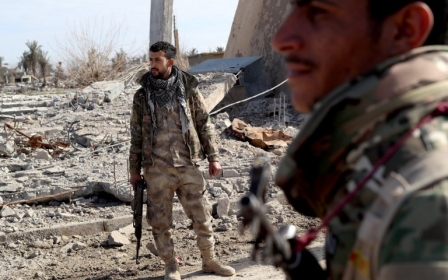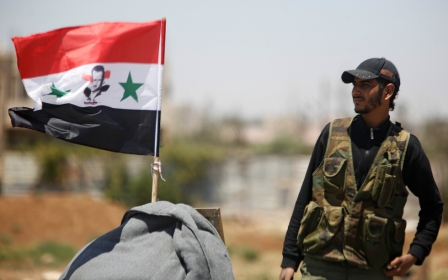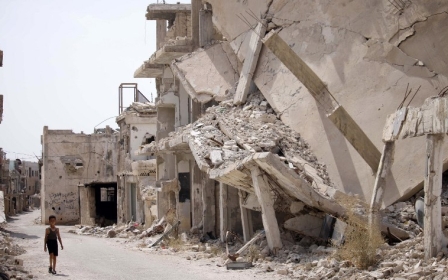US seeks to reassure allies in fight against Islamic State amid Syria withdrawal

As US President Donald Trump proceeds with plans to pull American troops out of Syria, dozens of foreign ministers in the Global Coalition against the Islamic State (IS) group will gather in Washington later this week to discuss a new phase in the war.
The one-day conference, set to take place on Wednesday, is a way for the United States to impress upon its allies that, despite recent criticism to the contrary, it isn't deserting them, said Imad Harb, director of research and analysis at Arab Center Washington DC.
"The administration is trying to reassure its coalition partners that it is not really abandoning them in the fight against ISIS," Harb told Middle East Eye, using a different acronym for IS.
Speaking to reporters on condition of anonymity on Monday, a US state department official stressed that Washington's goals in Syria have not been altered by the pullout.
"A withdrawal of US forces from northeast Syria is a change in the way we employ our military means under our broader strategy," he said. "It’s not a change in the strategy."
A report by the US Department of Defense, released earlier on Monday, also emphasised that US policy in Syria remains the same, even with Trump's decision to pull about 2,000 American troops out of the war-torn country.
"In January 2018, the US government described five desired end states for Syria," reads the report, which goes on to say that those objectives have not changed over the past year.
"These [objectives] included the 'enduring defeat' of ISIS, a resolution to the Syrian civil war under the auspices of the Geneva process, the removal of Iranian and Iranian-backed forces from Syria, the removal of weapons of mass destruction in Syria, and rebuilding so that displaced Syrians can return home," it states.
'Critical phase'
A second senior state department official said on a call with reporters on Monday that the foreign ministers' meeting will be an opportunity to discuss the resources needed in 2019 to build on previous gains against IS militants, as US troops withdraw from northern Syria.
The official hailed the "tremendous sacrifices" of the coalition's partners on the ground who lost thousands of fighters in the fight against IS.
"We're entering a very critical phase in which we need to expand the diplomatic cooperation to assist the populations in Iraq and northeastern Syria recovery from Daesh's rule," the second official said, using an Arabic acronym for IS.
"But also maintaining the significant pressure on ISIS as it increasingly turns to insurgent tactics to destabilise both northeastern Syria and Iraq."
IS has been driven out of most of the areas it controlled in 2014 across Iraq and Syria, but the US official stressed that the "territorial defeat" of the militants does not mean the campaign against them is over.
"Both the president and the Secretary [of State Mike Pompeo] have been forceful in saying we will do what is necessary - across the globe - to ensure that defeat."
The official outlined four themes in the strategy against IS: recognising the "liberation" of Iraq and Syria from the militants and preventing their resurgence; reaffirming the coalition's ties and commitments to the Iraqi government; maintaining cooperative pressure in the global fight against IS; and ensuring that the militants are held accountable for their crimes.
Yazidi genocide survivor, human rights activist and Nobel Peace Prize recipient Nadia Murad, along with the head of the UN investigative team into IS crimes, Karim Khan, will address the last objective during the conference on Wednesday.
Earlier this week, Washington also urged Western nations to "repatriate and prosecute their citizens" who fought with IS and are held by Kurdish fighters in Syria - an issue that is also likely to come up at the meetings.
Political solution
On the sidelines of the conference, a "small group" ministerial meeting - consisting of the US, Egypt, France, Germany, Jordan, Saudi Arabia, and the UK - will convene to express support for the efforts of UN envoy Geir Pedersen to find a political settlement to the conflict in Syria.
US officials say that finding a peaceful resolution to the conflict is vital for the eradication of IS.
There's no such a thing as defeating a terrorist organisation if the conditions for this terrorist organisation's existence are still there
-Imad Harb, Arab Center Washington DC
On the call with reporters Monday, the first of two state department officials said that without a deal to end the conflict between the Syrian government and rebels, the war may breed militancy and instability that could threaten world peace for decades.
"I think the way we view it is that it’s unrealistic to think that the Syrian conflict is going to be resolved in any kind of stable, sustainable way without a political settlement between the Syrian regime and its opposition," he said.
Harb, of the Arab Center, also said that defeating IS won't be possible without a change in the security and political landscape that led to the group's creation.
"There's no such a thing as defeating a terrorist organisation if the conditions for this terrorist organisation's existence are still there," Harb said.
"ISIS was created after the American invasion of Iraq and the mismanagement of the Iraqi transition and governing process. Those situations have not really disappeared."
Middle East Eye propose une couverture et une analyse indépendantes et incomparables du Moyen-Orient, de l’Afrique du Nord et d’autres régions du monde. Pour en savoir plus sur la reprise de ce contenu et les frais qui s’appliquent, veuillez remplir ce formulaire [en anglais]. Pour en savoir plus sur MEE, cliquez ici [en anglais].




